How the Harris Campaign is Connecting with Swifties
Taylor Swift's endorsement of Kamala Harris has mobilised the Swiftie fanbase, raising funds and boosting voter engagement for the 2024 election.
 Hafiz
Hafiz
Introduction
On September 11, the debate between US presidential candidate Harris and Trump came to an end. Due to the fact that "both candidates of the two parties have become 'radicalized' at the same time and the middle voters have been abandoned", the election situation has become "complicated and confusing" and is easily affected by various emergencies. Various polls also show that Harris and Trump are "inseparable" both nationwide and in various swing states, which makes this debate far more important to the election results than the same period in history. Since voters do not fully understand Harris's policy propositions, this debate has a decisive impact on whether she can win the election.
For the highlights of the presidential debate, the core is not the specific policy propositions of the candidates of the two parties (these have been repeatedly promoted in various campaign activities), but who performs better, who can better impress the "swing voters" who have not yet made a decision, and who makes a major mistake. In terms of these dimensions, Harris is undoubtedly the winner of this debate: Trump was successfully angered by Harris about half an hour after the debate began, and he lost his composure, repeatedly answered questions, argued with the host, and even insisted on the rumor that illegal immigrants eat pets. According to the CNN/SSRS quick poll after the debate, 63% of the audience believed that Harris won, and only 37% believed that Trump won. At the same time, after the debate, Taylor Swift, who has an unparalleled influence among young people in the United States, clearly endorsed Harris in writing for the first time, which further increased Harris's momentum.
However, even so, it is still difficult for us to judge who will win the election, Harris or Trump. In our previous article "What will happen if Trump is elected", we discussed in detail the "three major expectation gaps" that will be brought about if Trump is elected: "destructive" is significantly stronger than the first term, the intensity of global geopolitical turmoil and gold prices "have no ceiling", and domestic policies will focus more on security rather than stimulation.
In this article, we will discuss in detail: the fundamental reason why this election has become so unpredictable, the most important "expectation gap" of Harris's policies - embracing Obama's radical line rather than continuing Biden's moderate line, and introduce in detail the impact of its specific economic, diplomatic, domestic and other policies on the US economy, "secondary inflation", global geopolitics, domestic policy direction and major asset prices, what are the best and worst results of this election, and the enlightenment of the "chaos" in this election process to "times change" and thinking framework. These key issues are for readers.
(I)
The confusing election situation: the abandoned "middle voters" under the simultaneous "radicalization" of both parties
We released "2024: What are the opportunities and risks of the global and Chinese capital markets?" on New Year's Day this year. 》In the market, we first pointed out that Trump's chances of winning were significantly lower than market expectations. In July, when Trump was "at his peak" after Biden's poor performance in the debate and the shooting, we still firmly emphasized in the article "What will be the impact if Trump is elected?" that "Trump's chances of winning are significantly lower than market expectations." Subsequently, with Biden's withdrawal from the election and Trump's choice of the radical Vance as his vice presidential candidate, his polls in the country and key swing states fell rapidly, and Harris was in the limelight for a while. However, just when Harris was "at her strongest momentum" in early August, several of her key decisions substantially reduced her chances of winning and made the final election situation of this election "complex and confusing." Whether we can unite the strength of our party and attract middle-class voters is the most important indicator for judging the election situation in the US presidential election: in the 2016 election, the key reason why Trump became a "dark horse" was that the then Republican bigwigs such as the Bush family and McCain all united around him, while Hillary Clinton's arrogance towards radicals such as Sanders caused the Democratic Party to split; in the 2020 election, the key reason why Trump lost to Biden, who was unanimously favored by domestic self-media, was that Republican establishment bigwigs such as Bush Jr. and Romney clearly did not support Trump, while Biden united various forces within the Democratic Party including Obama and Sanders, and even Republican moderates such as the McCain family.
Therefore, when Trump chose the radical and young Vance as his vice presidential candidate in July, it caused widespread concerns among female middle-class voters and the Republican establishment, and continued to attack the Republican establishment governors in key swing states such as Georgia and Arizona, strengthening the division within the Republican Party. Although the market unanimously expected him to win due to shootings, we firmly believed that his chances of winning were significantly overestimated. We pointed out in the article at the time that after Biden withdrew from the election, if Harris chose moderates in key swing states, such as Pennsylvania Governor Shapiro or Arizona Senator Kelly as his deputy, Harris's chances of winning would be very high.
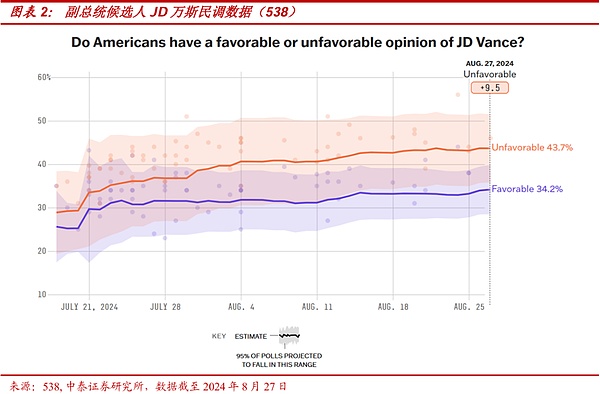
"Radical Left vs. Radical Right" - The impact of choosing Waltz as the Democratic vice presidential candidate. Unfortunately, on August 6, he chose Minnesota Governor Waltz as his vice presidential candidate. Although Waltz's identity as a white uncle seems to complement Harris, his position on many issues that American voters care about most, such as illegal immigration and public security, belongs to the "radical left". For example, he once said that he would give ladders to illegal immigrants to help them climb over the border wall; the "Floyd riots" in 2020 occurred in Minnesota, and one of the important reasons why it triggered riots across the United States was Governor Waltz's restrictions on police enforcement.
Harris's choice of Waltz as the vice presidential candidate made this year's US presidential election present the characteristics of "radical left vs. radical right, while the most critical middle voters, who account for 40%, were completely abandoned": after Harris's choice of Waltz as the Democratic vice presidential candidate was announced, Republican moderate voters such as the "Haley Campaign Alliance" who were originally very dissatisfied with Trump and expressed their support for Harris began to become hesitant and worried. Harris's "price control" economic policy: It is easy to be labeled as "radical left". The capital market's perception that Harris's "radical left" stance may significantly drag down the election is due to the announcement of Harris's economic campaign platform on August 15. Among them, the attempt to control inflation through "price control" - he claimed that "the first federal ban on food price gouging in US history will be issued" is particularly controversial: it not only violates the basic principles of economics and the fact that the net profit margin of US retailers has dropped from 5.9% to 3% during the past two years of high inflation, but also directly damages the vital interests of food and retail industry practitioners in various key states.
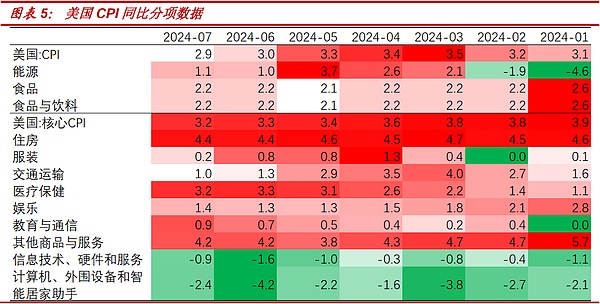
These economic policy proposals, together with Waltz's appointment as a vice presidential candidate and Harris's own poor record in illegal immigration control, made it easy for Trump to label her as "radical left-wing", which led to continuous attacks and blood loss. Therefore, after Harris' economic policy proposals were announced, Harris's winning rate on the gambling website Polymarket dropped rapidly by 10%, and global major asset classes once again showed the return of the "Trump trading combination" of weak dollar, crude oil and strong gold.
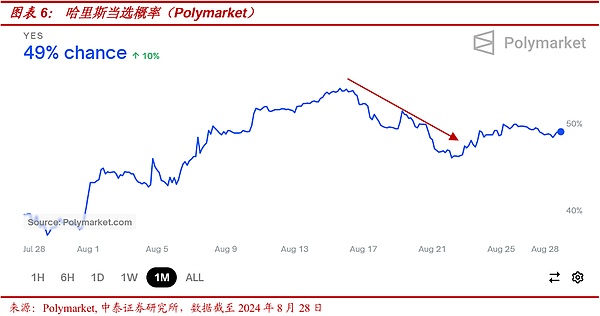
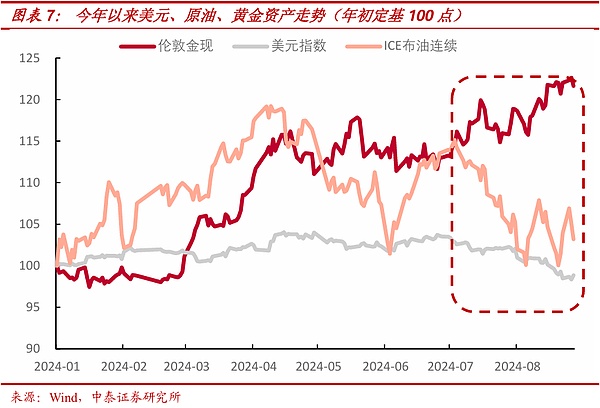
Of course, this does not mean that Trump’s election is a “done deal,” but that when Harris chose Waltz, the originally highly certain election situation began to become “confusing” and highly uncertain: because both parties abandoned the middle-class voters at the same time, the general election became a game of “who makes more mistakes?”
From this perspective, Trump is currently facing various unfavorable factors, such as being too old, and the frequency of rallies in key swing states is significantly lower than that of the younger Harris; the misappropriation of various costly legal lawsuits has made the already limited campaign funds even more stretched. Except for Pennsylvania, the number of campaign advertisements placed by Harris in various key swing states is significantly greater than that of Trump; the attack on the Republican establishment has caused former President Bush and Senate leader McConnell to continue to be silent at this year's Republican National Convention, while in contrast, former presidents including Biden, Obama, Clinton, representatives of the Democratic radicals such as Sanders and AOC, and hot contenders for the vice presidential candidate such as Pennsylvania Governor Shapiro and Kentucky Governor Beshear have all appeared on the scene to support Harris.
In short, when the two parties have become a game of "who makes more mistakes", the election itself is extremely sensitive to various non-sudden factors, which makes the difficulty of predicting the current US election situation significantly increased compared with before, and we can only keep close track.
(II)
If Harris is elected, she is more likely to choose the "Obama-style radical route" rather than the "Biden-style moderate route"
With the election situation itself confusing, in our previous article "What impact will Trump's election bring?", the first key "expectation gap" is that, unlike the mainstream market's preference to refer to his first term in 2016-20 to analyze his policy direction, due to the past 8 years, Trump has completed the comprehensive control of the Republican Party's top leaders, and his power is unconstrained, the destructiveness of his election will be significantly greater than his first term.
Similarly, assuming Harris wins the election, the current mainstream market analysis is based on Harris's full endorsement and support from Biden, the Democratic Party's temporary "change of leadership", and the campaign platform basically inherits Biden's policies. The analysis of Harris's government policy believes that it will be a continuation of the "Biden route" of the past four years. We believe that if elected, Harris will more likely embrace or even promote the radical line of the Democratic Party in the Obama era, rather than Biden's moderate and centrist line.
First, from the source of Harris' power, that is, the pressure and support Biden faced before and after his withdrawal from the election: after Biden's poor performance in the presidential debate exposed his health risks, progressives in the Democratic Party, such as Sanders, AOC, the Congressional Black Caucus, the Latino Alliance, the Clintons, and American labor unions, have always strongly supported Biden to continue his campaign, while Pelosi and Obama have used various direct and indirect means to pressure Biden to withdraw from the election.
Second, from the process of Harris's appointment of the vice presidential candidate, Biden and the Clintons both proposed to choose Pennsylvania Governor Shapiro as the vice presidential candidate, which would maximize the probability of winning the election, while Obama and Pelosi recommended Waltz, who valued Waltz's ability to continue to promote the so-called "progressivism".
Secondly, judging from the composition of Harris' campaign team, Bloomberg reported that as soon as Biden withdrew from the election, Harris reorganized the campaign team and vigorously absorbed and reused the core members of Obama's campaign team, and "marginalized" the members of Biden's campaign team.
Finally, judging from the composition of the core decision-making think tank team, Biden's core decision-making team is mainly composed of experts in various fields, and is willing to adopt different opinions that are of practical help. For example: In 2021, Biden issued large-scale consumer subsidies when the US economy had clearly recovered. At that time, when mainstream American voices such as Powell and Yellen claimed that inflation was controllable, economist Samuelson repeatedly wrote articles in the Wall Street Journal and other media accusing this policy of causing US inflation to get out of control. When inflation in the United States rose across the board in 2022, Biden received Samuelson at the White House with high standards and humbly sought his economic policy opinions. This made Samuelson the most important economist influencing the White House's economic policies after 2022, and data such as the US core CPI were also temporarily controlled under his policies.
Harris' style is obviously different. The New York Times reported that Harris' important decisions rely on a multi-ethnic and cross-generational network of more than 20 consultants, friends and relatives around him. He calls them every day for help or advice.
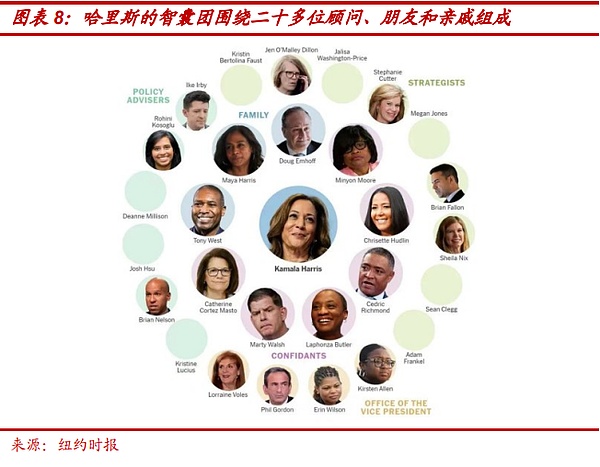
At the same time, when hiring people, Harris prefers "favorites" who are obedient to her and can provide "emotional value" rather than capable talents who can really help solve problems. This is particularly evident in the process of selecting vice presidential candidates: the reason why she chose Minnesota Governor Waltz, who could provide limited help to her campaign, rather than Pennsylvania Governor Shapiro, who could help her secure victory, was that Harris was attracted by Waltz's approachability and the "chemical reaction" they had in their exchanges, while Shapiro's "sharp" personality and "fighter image" made Harris' reaction to him mediocre after communicating with him.
Harris's above-mentioned characteristics determine that if he is elected, it will be difficult for his policies to rely on the power of experts and proceed from reality, nor can he take into account the interests of all parties. It is more likely that he will follow his own "feelings" and "policy intentions", just like the controversial economic policy program recently issued. And because of Harris's relatively shallow knowledge on many professional issues such as economics and his "radical left" "policy background". We predict that if he is elected, the challenges faced by the United States in dealing with various domestic and foreign affairs will be far greater than during the Biden era.
So, what specific impacts will Harris's "radical left" route have on the United States and the world? Next, we will conduct a detailed analysis from the perspectives of the US economy, politics and society, and diplomacy and the world.
(III)
What impact will Harris' economic policy bring under the "fair outcome"?
"Low prices, low taxes, and high social security" are the goals of Harris' economic policy.In his speech in North Carolina on August 17, Harris announced his first economic plan, "Agenda to Reduce Costs for American Families," and made it clear that he would focus on creating opportunities for the middle class and promoting their economic security, stability, and dignity. Overall, his economic policy propositions clearly reflect the strategic positioning of "firmly establishing a position on the side of the middle class."
Harris' economic policy framework attempts to correct market failures through government intervention and achieve fairer economic outcomes. As the logic explained in the previous report, the "hollowing out" of the US manufacturing industry has resulted in the lack of improvement in the income of the US working class, the shrinking of the middle class, and the intensification of the gap between the rich and the poor. The shrinking middle class has been the "victim of the globalized American society over the past 40 years." Harris has clearly positioned herself as a supporter of the middle class politically. The middle class has long been an important support group for the Democratic Party. By focusing on middle-class issues, the support of this key voter group can be consolidated. By promising to improve the lives of the middle class, it may attract some centrist and swing voters who originally leaned towards the Republican Party.
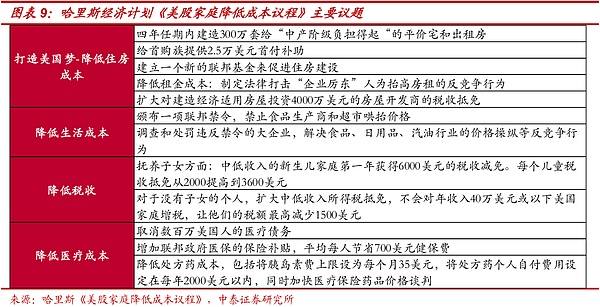
Harris's distinctive political stance is reflected in her series of "result fairness" policies aimed at strengthening and expanding the middle class, such as tax cuts, raising the minimum wage, and expanding medical insurance coverage. Specific measures include tax credits for education investment, subsidies for first-time homebuyers, and tax incentives for innovative small businesses, aiming to achieve "result fairness."
Specifically, the focus and length of Harris' economic policy advocacy is about residential housing. Harris believes that the housing shortage is first of all the supply-side reasons that developers lack the willingness to build just-needed housing, resulting in a shortage of supply and willingness, pushing up housing prices. She hopes to encourage developers who develop just-needed housing through tax breaks, and severely crack down on corporate landlords and large owners, reduce rents for Americans, and prohibit double-digit increases in housing rents. Harris advocates the construction of 3 million new homes to end the shortage of housing supply in the United States, and provide up to $25,000 in down payment support for just-needed home buyers on the demand side.
Secondly, Harris also promised to further reduce medical costs. Specifically, it includes increasing insurance subsidies for the federal government's health insurance market platform, setting an annual cap of $2,000 on prescription drug out-of-pocket expenses for all Americans, and eliminating medical debts for millions of Americans.
Finally, Harris' pursuit of "fair results" runs through her economic policies. She recognized that relying solely on market mechanisms may not be enough to solve the problem of inequality, so she added elements aimed at promoting fair outcomes on the basis of market-oriented policies. For example, through large-scale direct subsidies, tax cuts and debt forgiveness, these policies are expected to quickly increase the disposable income of low- and middle-income groups. For example, a monthly tax refund credit of $500 may directly increase consumer spending. These measures may boost economic vitality and increase aggregate demand in the short term, thereby promoting economic growth.
Harris's policy promises to cut the barriers of social inequality and open up a path to a better future for the middle class. However, the double-edged sword of this policy has not lost its danger because of its beautiful promise. While Harris pursues fair outcomes, the losses caused to the efficiency of the economic market will eventually continue to emerge.
First, Harris's "fair outcomes" policy may undermine the survival of the fittest mechanism, may weaken the natural selection process of the market, and reduce overall economic efficiency. Harris's economic policy focuses on reducing the cost of necessities and combating price gouging. Harris's efforts to promote the first federal bill in U.S. history to ban price fraud on food and daily necessities, and other price control measures, such as limiting food and daily necessities prices, may distort market signals and affect the balance of supply and demand.
Taking Harris's food price control policy as an example, the chain reactions it may bring include: grocery stores in low-income areas are closed, exacerbating the "food desert" problem. Food producers' profits decline, leading to a reduction in product variety and quality. Small food producers and retailers go bankrupt, and market concentration increases. This may lead to a shortage of supply of certain commodities, and strict regulation of enterprises may inhibit innovation and investment enthusiasm, thereby affecting the dynamic efficiency of the economy.
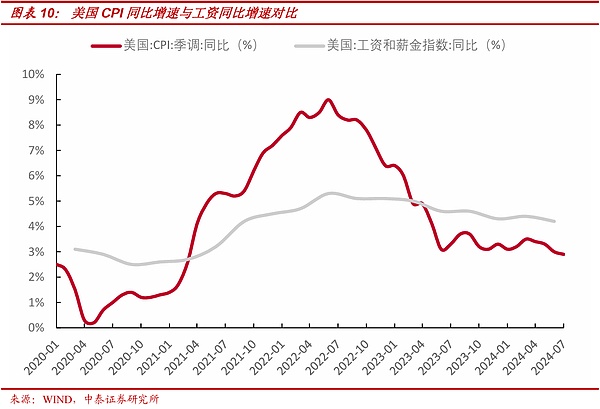
Secondly, fiscal spending pressure has increased sharply. If Harris is elected, her focus on implementing these "fair outcomes" policies will undoubtedly require huge fiscal spending, which may put more pressure on the already huge U.S. national debt. Although the Congressional Budget Office (CBO) predicts that the primary deficit rate will drop to 3.1% in fiscal year 2025 from 3.9% in fiscal year 2024, Harris's policy proposals may cause this forecast to be significantly increased. Her recently proposed policies, including "down payment support" for first-time homebuyers and tax breaks for child support, will push up government spending. In addition, Harris may continue the Biden administration's student loan relief plan, which is one of the important factors that caused the deficit rate to rise beyond expectations in fiscal year 2024.
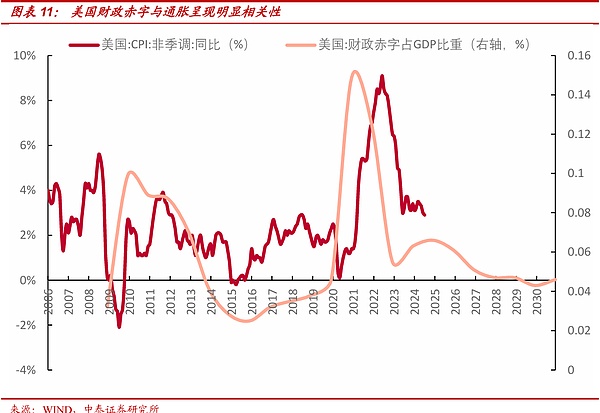
Such a large-scale fiscal expansion may trigger inflationary pressure. Its mechanism of action can be summarized as follows: the government may adopt an expansionary fiscal policy. Increased government spending will lead to more funds flowing into the banking system, prompting a significant increase in bank reserves. The expansion of credit supply will lead to increased inflationary pressure. In terms of monetary policy, in order to combat the inflationary pressure brought about by fiscal expansion, the social interest rate level may stay high for a long time ("high for longer") to combat the medium- and long-term rise in the inflation center.
Finally, Harris's "result fairness" policy may have a profound impact on the global economy. As the world's largest economy, the United States' policy changes often have spillover effects. Large-scale fiscal stimulus may lead to a depreciation of the US dollar and affect global financial markets. If it leads to a resurgence of inflation or a debt crisis in the United States, it may pose a threat to the stability of the global economy.
(IV)
Harris’ foreign policy: “Ideology in command”, disordered oil prices
As for Harris’ foreign policy, compared with the widely believed that she will inherit Biden’s diplomatic line, The Washington Post pointed out: On the one hand, Harris does not have a large diplomatic staff team like Biden, and on the other hand, five current and former officials believe that Harris does not trust Biden’s diplomatic staff and is worried that if she expresses any dissent, the president’s aides will leak the details of her comments.
At the same time, her aides and allies pointed out that Harris, like former President Obama, is a lawyer with a social justice tendency. She dares to challenge the views of her staff and defends “law and order” with the enthusiasm of a prosecutor.
That is to say, her foreign policy will continue Obama’s rather than Biden’s diplomatic line. So, what are the characteristics of Obama’s foreign policy? Starting from the so-called human rights, "political correctness" and other Western left-wing ideologies, rather than based on actual interests and order stability, it is essentially supporting various unstable forces on a global scale, which will increase the risk of various local geopolitical conflicts and lay long-term hidden dangers. The intensifying refugee crisis in Western countries, the rising energy prices and the Yemeni Houthi armed forces, which have a significant impact on Red Sea shipping and the international prestige of the United States, are also the long-term consequences of the Obama administration's "ideology-led" foreign policy that has caused disorder in the Middle East. From 2011 to 2012, the Obama administration disregarded the national conditions of the Middle Eastern countries and the actual national interests of the United States. Simply because its domestic politics was an "authoritarian government" as defined by the West and was inconsistent with the Western left-wing "political correctness" ideology, it condoned and even supported the "Arab Spring" of various unstable forces in the Arab region, overthrowing the regimes of Mubarak in Egypt and Saleh in Yemen, which were relatively close to the United States in political and economic stances and were once important means for the United States to influence the Arab world and crude oil prices, and were also important forces for stability in the Gulf region.
After the above-mentioned regional stability forces were destroyed, on the one hand, it brought about the rise of radical forces such as the Houthis in Yemen, which in turn brought about the protracted turmoil in the Red Sea and the Middle East. For example, the continued attacks by the Houthis in Yemen on global merchant ships in key routes such as the Red Sea caused the volume of the Suez Canal in Egypt to drop by 35% year-on-year in early 2024. A large number of international merchant ships had to detour around the Cape of Good Hope, which took more than two weeks, which increased the transportation cost of crude oil and other materials by about US$500,000 to US$1 million per voyage; and the frequent attacks by the Houthis in Yemen on Saudi oil fields required Saudi Arabia to constantly and temporarily interrupt crude oil production, which affected crude oil production by about 5.7 million barrels per day. All of these have driven the continued high international crude oil prices, and are also an important reason for the rise in inflation in Western countries including the United States.
On the other hand, the rise of various radical forces has caused long-term disorder and wars in the Middle East, such as the Syrian Civil War and the Yemeni Civil War. The war has caused a large number of wealthy middle-class people in Arab countries to quickly become refugees, causing a humanitarian crisis. The solution given by Western politicians represented by Obama and German Chancellor Merkel is to indulge and introduce a large number of Muslim refugees with huge cultural differences from their own countries, thinking that they can bring low-cost labor. However, the difficulty in cultural integration and conflicts with the main ethnic groups have led to the continuous deterioration of domestic security and conflicts in the West and the elimination of social consensus, which has led to the continuous rise of Western extreme right-wing forces represented by Trump and Le Pen, who are "anti-immigration" and "anti-order", in recent years.
If Harris is elected, his continuation of Obama's radical "ideology-led" line in diplomacy will make the already precarious Middle East even more turbulent. At the same time, Saudi Crown Prince Salman's relatively poor image in the eyes of the Western left may make Saudi Arabia and the Gulf countries more alienated from the United States. In addition, the radical environmental protection policy will restrict the supply of shale oil in the United States, which will further strengthen crude oil prices.
And because oil prices and electricity prices are the main components of US inflation, and Harris' radical "welfare" policy - housing subsidies push up housing prices, and a substantial increase in the minimum wage pushes up wages, it can be expected that if he is elected, the US inflation center will inevitably rise further.
At the same time, Harris's "radical left-wing" advocacy of "ideology in command" is expected to further promote the "awakening culture" that has long been criticized in the United States, that is, the so-called "political correctness" represented by "identity politics" and "diversity". This identity politics and Harris-Waltz's "left-wing stance" on illegal immigration and public security issues that are increasingly affecting the vital interests of the people may further increase the hatred between ethnic groups in the United States and further disintegrate social consensus, and bring about the intensification of social unrest in the United States.
The combination of the above factors will make the overall gold price show a steady upward trend if Harris is elected.
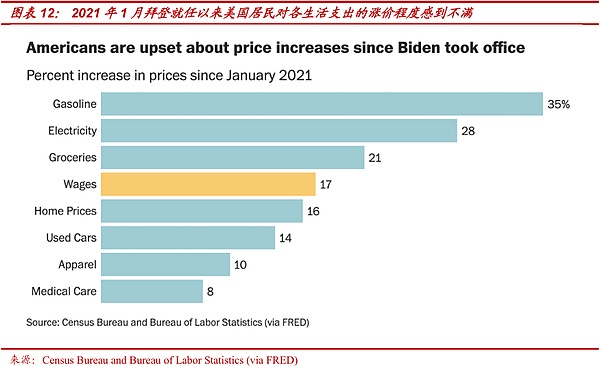
(V)
Sino-US relations under Harris’ election: controllable risks and opportunities for domestic policy “shift”
However, it should be pointed out that, compared with the fundamental impact on the post-World War II international order brought about by Trump’s uncontrollability and the “unlimited” gold price under the “turbulent waves”, the “upper limit” of the intensity of global geopolitical risks under Harris’ election is relatively controllable, so the rise in gold prices will be more characterized by a relatively gentle slope:
First, Harris’ attitude on key geopolitical issues such as Russia and Ukraine is, on the whole, to maintain the post-World War II international order. It will continue and strengthen the Democratic Party's long-standing cooperation between the United States and traditional allies such as NATO, the European Union, Japan and South Korea, and will strive to fulfill the United States' international obligations and treaty obligations on key geopolitical issues, which will make the cornerstone of the dollar hegemony - the cornerstone of the American order system after World War II - relatively stable.
Secondly, Harris may continue the Biden administration's strategy of "competition without confrontation" or "engagement + containment" in the most critical Sino-US relationship in the world, that is, while strengthening restrictions in high-tech and other aspects, maintain trade contact with China (without excessive imposition of universal tariffs) and respect, and clarify positions on important geopolitical issues. This strategy itself will minimize the probability of unexpected "black swan" risks caused by misjudgment on both China and the United States.
Thirdly, compared with the labor union forces behind Biden, Harris himself and the Democratic Party forces behind him, such as Pelosi and Obama, benefit more from the "huge profits" brought by the globalized trade system. In particular, Waltz, the vice presidential candidate, is a senior "China expert" in Washington. He is very friendly, has visited China as a foreign teacher for ten consecutive years, speaks fluent Chinese, and advocates strengthening cultural and people-to-people exchanges between China and the United States, which coincides with the proposition of the leader when he went to the United States at the end of 23.
Although these tendencies may not change the general trend of Sino-US competition, and the reduction of existing tariffs and high-tech restrictions expected by the capital market is also unlikely to happen, these propositions are undoubtedly helpful in controlling the "intensity" and "upper limit" of the Sino-US conflict.
In the increasingly unstable international geopolitical environment, China and the United States, as the leaders of the East-West camp and the "cornerstone" of global geography, the intensity of the Sino-US conflict is controllable, which also means that the intensity of the confrontation in this round of global geopolitical turmoil is more moderate than in similar stages in history, which is also a blessing for the people of China and the United States, and even for all mankind.
As for domestic policies, the focus of policies after the 19th CPC National Congress has been on the balance between security and efficiency, which is the most important consideration for the periodic adjustment and change of policies, and the changes in the overall external geopolitical environment are the most important background for the periodic adjustment of the focus of such policies. In "What will be the impact if Trump is elected", we proposed that compared with the traditional GDP-centered economic policy framework that emphasized demand-side stimulus in aggregate policies from 2012 to 2018 and modern service industries represented by the Internet in industrial policies, after 2018, the aggregate policy has always maintained a steady and unexpected focus on demand-side stimulus, and the entire focus of industrial policies has been on high-end manufacturing industries that are closely related to national security and armaments capabilities, such as new quality productivity, "stuck neck", "hard technology", etc. This fundamental change in the economic policy framework is closely related to the significant increase in global geopolitical insecurity caused by the Sino-US trade war led by the Trump administration in 2018. Therefore, if Trump is re-elected, due to the "storms" brought about by the more unrestrained power and his disregard for the basic principles of the international order to the global geopolitics, the direction of domestic policy will be to further focus on security rather than the stimulus expected by the market. Similarly, if Harris is elected, the relatively controllable "intensity" of the Sino-US risks and the clear attitude on key geopolitical issues will make the security risks relatively controllable, and the competition between China and the United States will be based more on peaceful competition, that is, the framework of economic efficiency. On this basis, if the pressure on the endogenous momentum of the domestic economy increases further next year, similar to the focus on economic efficiency in the second half of 2022, the "opportunity for a phased policy shift" that is relatively favorable to the capital market may also gradually approach. (VI) Focus on the congressional elections: What is the "optimal result" under the "radicalization of the two parties"? Combining the above analysis and the previous article "What will be the impact if Trump is elected?", this election presents a "radical left vs. radical right" trend, which means that no matter who is elected in the end, it is not good news for the United States or even the world order (see Figure 14 for details).
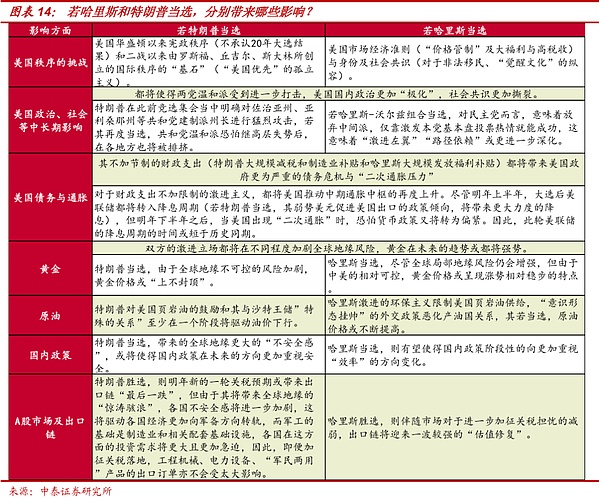
From this perspective, with the simultaneous "radicalization" of candidates from both parties in the United States, how to reduce the impact on the United States and the world order, the results of this congressional election are more important than ever. Perhaps for the United States and the world order, the best result of this US election is: Harris wins (she is more controllable than Trump), but the Democratic Party loses at least one of the Senate and the House of Representatives, making it more difficult for Harris' radical policies to be implemented. Correspondingly, the worst result of this election is that Trump wins the election and the Republicans control both the Senate and the House of Representatives. In this case, the "destructiveness" brought about by Trump without any constraints and the degree of turmoil in global geopolitics may be "stormy."
Based on the comprehensive analysis of the latest recent polls, although the outcome of the presidential election in this election has become increasingly unpredictable since the combination of candidates from both parties has become "radicalized", the momentum of the Senate and House elections has become increasingly clear: the probability of the Democratic Party regaining control of the House of Representatives has been steadily ahead of the Republican Party, and there are signs that the momentum will continue to expand recently; accordingly, since 23 of the 34 seats involved in this Senate election are from the Democratic Party, the probability of the Republican Party regaining the Senate is relatively high. The latest polls show that the Republican Party may become the majority party with a slight advantage of 51:49.
Perhaps the current polls show that the Senate and the House of Representatives belong to the two parties and both have a slight advantage, which makes the radical policies of the presidential candidates effectively restrained by the legislative power during the implementation process, and they have to make certain compromises with the centrists, which may be the only way to break the increasingly "radical" pattern of the two parties in this election.
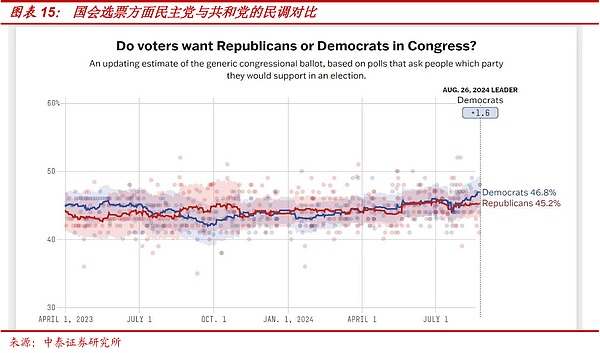
(VII)
“The revelation of the simultaneous radicalization of the two parties”: welcoming a more turbulent “new era” in the world
Behind the rise of more and more radical forces and the decline of establishment forces are increasingly irreconcilable and disordered social contradictions, and all of this is caused precisely by a series of “short-sightedness” and “greed” of the Western establishment elites themselves over the past forty years:
In our previous article “What will be the impact if Trump is elected”, we pointed out that over the past forty years, the irresponsible “globalization” of Western countries and the pursuit of short-term corporate profits have brought about the long-term collapse of local manufacturing capabilities, the shrinking of the domestic middle class, and the long-term intensification of social divisions, which are the economic reasons behind political polarization.
In addition, as the capital of Western countries ages, they have irresponsibly introduced a large number of illegal immigrants such as Muslims who are incompatible with their own traditional culture in order to pursue cheap labor in a one-sided way and for the sake of short-term election victories and the so-called "iron electoral base" of Western political elites such as Obama and Merkel. They have also tried to forcibly promote a distorted "awakening culture" and "identity politics" to suppress the dissatisfaction of ordinary people with these short-sighted measures and divert the "labor-capital conflict" since the 2008 financial crisis. However, this has triggered a truly dangerous long-term disaster for a country: the intensification of racial conflicts and the opposition to social consensus.
Compared with the early years of the U.S. founding until the last century, when the debates between the candidates were mainly conducted in newspapers, detailing their serious and meticulous policy views and political resumes, the Internet, social media, and short videos, in pursuit of short-term traffic effect benefits, have neglected the "fact check" of basic policy views, and have increasingly catered to "entertainment," "seeking attention," and even "conspiracy theories" and other remarks and politicians. Through "algorithm recommendation" and "targeted push" of specific similar views, the masses who originally had only slightly different opinions have formed "information cocoons" that are difficult to communicate with and constantly self-reinforce, becoming a "hotbed" for cultivating political polarization and confrontation.
This means that those who can win elections are often not the political experts who are best at governing the country, but the "talk show actors" who are more capable of sensationalism and incitement. This is true for both parties in the United States. For example, in the 2004 election, the Democratic candidate Kerry, a veteran of the Vietnam War, lost to the younger Bush Jr., and in 2008, the Vietnam War hero McCain and the experienced political Romney lost to Obama in 2012. These are all manifestations of this "reverse elimination". This in turn makes the two parties in the United States increasingly inclined to recommend so-called "radical views" and "charismatic personalities" in the new generation of political echelons in order to win elections.
Economist Keynes once said, "In the long run, we are all dead." This sentence was once regarded as a "golden rule" by the financial circle. Over the past four decades, the "economic globalization", "immigration", "identity politics" and "traffic" promoted by the Western establishment elites are all manifestations of the "short-sighted" concept of pursuing short-term profit maximization at this extreme, while ignoring the accumulation of long-term risks in political, economic, cultural and social policies. Its essence is a "squandering" of a series of economic, political, social and international order stability "foundations" that constitute the long-term global peace after World War II, and an extreme "greed" of "selling the father's land without feeling sorry".
However, long-term risks will eventually accumulate like "sands gather to form a tower", and the greed and short-sightedness of the establishment elites will eventually be "bitten back" by the radical populism they created. However, populism driven by the anger of the grassroots people is essentially a "destructive" force. The release of this "destructive" force may not bring about the "utopia" expected by its supporters, but the further collapse of the "foundation" of the global order after World War II. As the saying goes, "people's minds are in chaos".
As the saying goes, “The general trend of the world is that peace will eventually lead to division.” There is also a Western proverb that says, “Difficult times create strong people, strong people create prosperous times, prosperous times breed weak people, and weak people bring difficult times.” That is to say, after nearly eight decades of global peace after World War II and the “bonus period” of global high growth in the past four decades, a “new era” with more turbulent global geopolitics may be about to begin.
“Summer insects cannot talk about ice.” For investors, it may be imperative to establish a paradigm of economic, policy and investment thinking in the “new era” that pays more attention to “security”, and avoid mechanically applying the “Keynesian framework” of the high-growth era that only focuses on “short-term efficiency” and underestimate the risks of the “new era”, which will lead to a series of investment misjudgments.
Risk warning: The US economy is down more than expected, global liquidity is tightening more than expected, domestic industrial policies are not implemented as expected, the "black swan" event before the US election has an impact, and global geopolitical turmoil is expected to rise more than expected.
Taylor Swift's endorsement of Kamala Harris has mobilised the Swiftie fanbase, raising funds and boosting voter engagement for the 2024 election.
 Hafiz
HafizIn her first campaign speech, Kamala Harris has committed to pushing for stricter gun control measures, continuing her more assertive stance on the issue compared to Biden and contrasting with the reduced emphasis on gun policy seen in the Trump campaign.
 ZeZheng
ZeZhengVice President Kamala Harris' campaign has raised $540 million, driven by a surge in donations during the Democratic National Convention. The campaign has outpaced former President Donald Trump’s fundraising efforts, with significant support from young voters and women.
 Xu Lin
Xu LinKamala Harris enlists David Plouffe, ex-Binance advisor, amid attempts to win over the crypto industry.
 Huang Bo
Huang BoGolden Finance launches Golden Web3.0 Daily to provide you with the latest and fastest news on games, DeFi, DAO, NFT and Metaverse industries.
 JinseFinance
JinseFinanceCoinbase is attempting to change the narrative around cryptocurrencies as part of an upcoming television advertisement campaign.
 Others
OthersAccusing the self-proclaimed Bitcoin founder of being a mentally ill scammer shouldn’t be allowed in a democracy, Wright’s lawyers said on the final day of an Oslo trial.
 Coindesk
Coindesk Beincrypto
BeincryptoBlockchain security firm Halborn has warned users of the latest phishing emails doing the rounds.
 Cointelegraph
CointelegraphOn Sunday 29 May, two final rounds of campaigns came to an official end for the AuroraFS P2P cloud storage ...
 Bitcoinist
Bitcoinist